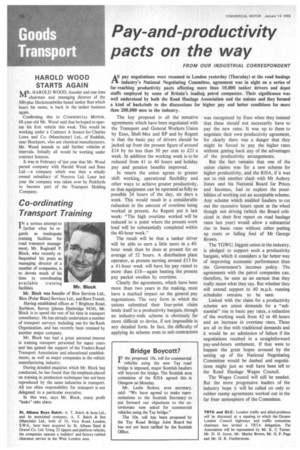Pay-and-productivity pacts on the way
Page 28

If you've noticed an error in this article please click here to report it so we can fix it.
FROM OUR INDUSTRIAL CORRESPONDENT
Ile pay negotiations were resumed in London yesterday (Thursday) at the road haulage industry's National Negotiating Committee, agreement was in sight on a series of far-reaching productivity pacts affecting more than 10,000 tanker drivers and depot staffs employed by some of Britain's leading petrol companies. Their significance was well understood by both the Road Haulage Association and the unions and they formed a kind of backcloth to the discussions for higher pay and better conditions for more than 200,000 men in the industry.
The key proposal in all the tentative agreements which have been negotiated with the Transport and General Workers Union by Esso, Shell-Mex and BP and by Regent is that the basic pay of drivers should be jacked up from the present figure of around £14 by no less than 50 per cent to £21 a week. In addition the working week is to be reduced from 41 to 40 hours and holiday pay and pension benefits improved.
In return the union agrees to greater shift working, operational flexibility and other ways to achieve greater productivity, so that equipment can be operated as fully as possible 24 hours of the day, six days a week. This would result in a considerable reduction in the amount of overtime being worked at present. As Regent put it last week: "The high overtime worked will be reduced to a point where the present work load will be substantially completed within the 40-hour week."
The result will be that a tanker driver will be able to earn a little more in a 40hour week than he does at present for an average of 52 hours. A distribution plant operator, at present earning around E13 for a 41-hour week will have his pay raised to more than £1 8—again beating the present pay packet swollen by overtime.
Clearly the agreements, which have been more than two years in the making, must have a marked impact on the general pay negotiations. The very form in which the unions submitted their four-point claim lends itself to a productivity bargain, though an industry-wide scheme is obviously far more difficult to devise, if not impossible in any detailed form. In fact, the difficulty of applying its scheme even to sub-contractors was recognized by Esso when they insisted that these should not necessarily have to pay the new rates. It was up to them to negotiate their own productivity agreement, for clearly there was a danger that they might be forced to pay the higher rates without getting back any of the advantages of the productivity arrangements.
But the fact remains that one of the union claims was for a new scheme for higher productivity, and the RHA, if it was not to risk another clash with Mr Aubrey Jones and his National Board for Prices and Incomes, had to explore the possibilities of working out an acceptable scheme. Any scheme which enabled hauliers to cut out the excessive hours spent at the wheel though not driving (which the Board criticized in their first report on road haulage rates last year) would allow a substantial rise in basic rates without either putting up costs or falling foul of Mr George Brown.
The TGWU, biggest union in the industry, is pledged to support such a productivity bargain, which it considers a far better way of improving economic performance than the Government's incomes policy. The agreements with the petrol companies can, therefore, be seen as an earnest that they really mean what they say. But whether they will extend support to 40 m.p.h. running schedules remains to be seen.
Linked with the claim for a productivity scheme are union demands for a "substantial" rise in basic pay rates, a reduction of the working week from 42 to 40 hours and an increase in overtime rates. These are all in line with traditional demands and it would be an admission of failure if the negotiations resulted in a straightforward pay-and-hours settlement. If that were to happen the great hopes aroused by the setting up of the National Negotiating Committee would be dashed and negotiations might just as well have been left to the Road Haulage Wages Council.
The Wages Council will still be needed. But the more progressive leaders of the industry hope it will be called on only to rubber stamp agreements worked out in the far freer atmosphere of the Committee.
















































































































































